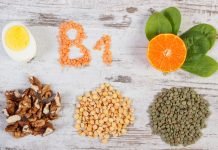Vitamin B Complex
According to Jaime Herndon from Live Strong, vitamin B complex is a group of eight B vitamins. They are found in animal and plant sources and play a variety of roles in the body. Making sure you get enough B vitamins is beneficial in several ways. (1)
B vitamins include:
- B1 – Thiamin
- B2 – Riboflavin
- B3 – Niacin
- B5 – Pantothenic Acid
- B6 – Pyridoxine
- B7 – Biotin (vitamin H)
- B9 – Folic Acid
- B12 – Cobalamin
Proven health benefits of vitamin B complex
- Supports energy-yielding metabolism
- Helps maintain healthy skin
- Reduces tiredness and fatigue
- Promotes nervous system function
- Supports regular macronutrient metabolism
Based on these reports, it may help improve
- Digestion
- Fatigue and tiredness
- Stress and related symptoms
- Acne, eczema, and psoriasis
What are the benefits?
1) Supports energy-yielding metabolism
Vitamin B complex is necessary for the absorption and metabolism of fats, carbohydrates, and proteins. It follows that vitamin B complex helps the body process the nutrients it needs for proper growth and development.
2) Helps maintain healthy skin
It is useful for skin problems like acne, eczema, and psoriasis, as a deficiency may contribute to skin conditions.
3) Reduces tiredness and fatigue
Vitamin B complex can help to reduce tiredness and fatigue and may be beneficial for individuals who take part in sport, who want to maximize their performance and ensure proper energy metabolism.
4) Promotes nervous system function
The complex could help relieve stress, low mood and insomnia. Insomnia and anxiety are often connected and therefore getting enough vitamin B could help individuals suffering from disturbed sleep.
Vitamin B complex works well with
- Sea kelp to increase metabolism, hair nail growth and repair
- Evening primrose oil for healthy skin, hair and nails, and to relieve PMS symptoms
- Valerian for insomnia and stress-related conditions
- Flaxseed oil to promote healthy digestion
- Ginseng to alleviate tiredness, fatigue, and to improve mental alertness
- Potassium to relieve low mood and stress
- Iodine for fatigue and tiredness
- Passionflower to help reduce stress
Some things to consider
According to David Heitz at Healthline, not all types of vitamin B do the same thing. They also come in different kinds of foods. For example, vitamin B12 is primarily in meat and dairy products. In contrast, vitamin B7 and B9, and to some degree, B1 and B2, are in fruits and vegetables. (2)
Taking too many B vitamins can cause different things to happen. Consuming too much vitamin B2 can cause urine to change colour to bright yellow or green, which is harmless. There are no other reported overdose symptoms of B2.
Vitamin B3 or niacin can cause flushing in some people. It is probably harmless and usually only lasts a few minutes. You can reduce the flushing by taking vitamin B3 on a full stomach or taking a no-flush formula such as niacinamide.
Consuming too much vitamin B6 can cause more severe symptoms such as peripheral neuropathy or a loss of feeling in the arms and legs. The problem usually resolves when you stop taking vitamin B6 supplements. According to the National Health Service (NHS), the peripheral neuropathy is permanent in some people. (3)
Resources
last accessed online 18/06/2020
- https://www.livestrong.com/article/352793-vitamin-b-complex-benefits-side-effects/
- https://www.healthline.com/health/symptoms-of-vitamin-b-deficiency
- https://www.nhs.uk/conditions/vitamins-and-minerals/vitamin-b/






